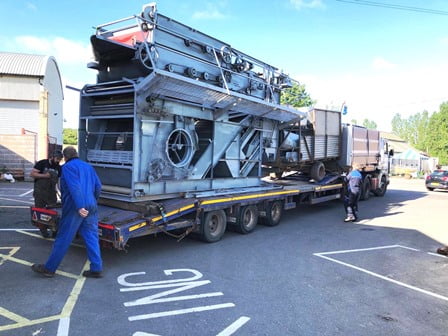Hogs Back Brewery in Tongham, Surrey, is preparing for the harvest of its hops later this month, after commissioning equipment that will enable it to pick, sort and dry the hops itself for the first time.
From 14th September, the Hogs Back team will be cutting down the hop bines in its 8.5 acre hop garden next to the brewery. The hops will then be driven just yards from the garden and fed into a reconditioned Wolf hop picker– which carefully separates the hop cones, required for brewing, from the rest of the bines. The hop cones are then loaded into the kiln,10 yards away, where they are dried, and then quickly vacuum packed to capture their flavour, and cold stored at 5°C on site until required.
The new equipment enables Hogs Back to complete its own harvesting this year, rather than sub-contract the task as previously. The move speaks volumes for Hogs Back’s commitment to its hop garden, which it first planted in 2014, then expanded in a new location closer to the brewery last year. This will be the first full harvest from the new site.
Rupert Thompson, Hogs Back Brewery owner, said: “We are looking forward to harvesting our hops for the first time. Processing our hops at the brewery reduces our carbon footprint as now, the hops are moved just yards from the garden to the hop picker, hop kiln, storage and, when required, to the brewhouse where they are added to our beers. They never leave our site, so they really are travelling ‘from field to firkin in a furlong’, which has been our ambition since planting the original hop garden six years ago.”
Hogs Back will harvest three hop varieties this year: Fuggles, used in its flagship TEA or Traditional English Ale; English Cascade, used in its Hogstar lager and Surrey Nirvana Session IPA and Farnham White Bine, a traditional local variety that the brewer saved from near-extinction. Harvesting of the Fuggles and White Bine should be completed within seven days of start, while the Cascade hops will be harvested at the end of September to allow them to ripen further. They are expecting a 70% yield from the hop garden this year.
Matthew King, Hogs Back’s hop garden manager, said: “This will be our sixth hop harvest and we’re confident it will be one of our best for hop quality. Each year, we’ve learned more about the best way to cultivate and harvest our hops, and having our own equipment this year gives us greater control, so we’ll be able to collect the hops at the optimum point, fully capturing the wonderful aromas that are then transferred into our beers.
“Hops thrive on heat and sunshine, but they also need water, so we’ve been grateful for the recent downpours. With more rainfall between now and harvest early in September, we can expect a good crop, especially considering this is our first commercial harvest from the new hop garden.”
In previous years, Hogs Back has celebrated the end of harvest with a traditional Hop Harvest Party, where over 2,000 guests enjoy live music and other entertainment, as well as pints of Green TEA – made from freshly-picked Fuggles hops. Social distancing precludes such a large gathering this year, but Hogs Back is making plans for a number of smaller events of up to 200 each day so that as many of its loyal drinkers as possible can help mark the 2020 harvest.
Thompson added: “Harvest 2020 is going to be different to the previous ones, but then everything this year has disrupted by the pandemic. We’re glad that, despite everything, we’ve been able to share the hop garden with our local customers, by opening our new Summer Bar with its commanding views over the ripening hop bines, and leading small groups on tours of the hop garden. We’ve found customers are delighted to get out in the fresh air after lockdown, and keen to learn about hop cultivation, which is such an important part of the region’s heritage.”
Hogs Back Hop Garden – key points
- The September 2020 harvest will be the first full harvest of the hop garden planted in spring 2019, occupying 8.5 acres of prime farmland on Manor Farm, next to the brewery. Last year, most of the hop plants were left in the ground, as is good practice, to allow them to grow stronger for subsequent years
- Total of 6,000 hop plants, including 2,000 transplanted from the original hop garden
- The hop plants are supported with over 100 large posts and ten miles of high tensile steel wire, strung 18ft above the plants.
- Hogs Back planted its original, 3.5-acre hop garden in 2014, and completed four harvests before moving to the larger site in spring 2019.
- Farnham was historically one of the most important hop farming regions in the UK. The Farnham area is ideal for hop growing with a rich, loamy top soil over a chalky subsoil.
- The Farnham White Bine hop was originally developed in the early 1700s just a mile and a half from the current Hogs Back brewery. It was highly prized for its aromas and was the precursor variety to the better-known Kent Goldings.
- Hop farming in Farnham started to wane at the end of the 19th century in the face of growing competition from the Kent hops, which were preferred by London’s brewers, and the rising cost of agricultural labour. The industry declined and finally died out in the mid-1970s.
- hogsback.co.uk.
